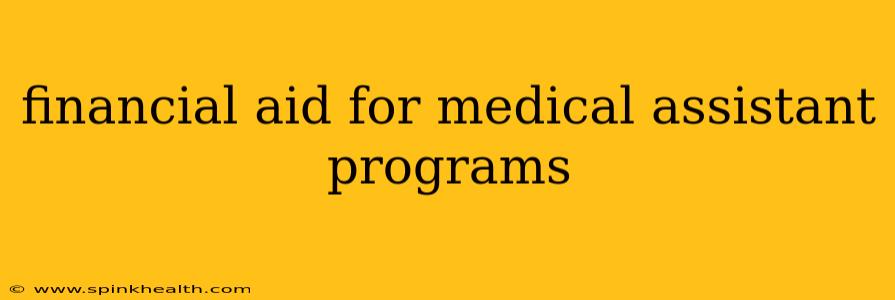Navigating the Maze: Finding Financial Aid for Medical Assistant Programs
The dream of a fulfilling career as a medical assistant is within reach, but the cost of education can sometimes feel like an insurmountable obstacle. Many aspiring medical assistants worry about how to finance their training. Fear not! This guide will unravel the complexities of securing financial aid and help you navigate the path to your medical assistant certification. It's a journey, and like any good medical procedure, we'll take it step-by-step.
My name is Sarah, and I've been working in the financial aid field for over a decade, helping countless students achieve their educational goals. I understand the anxieties surrounding funding, and I'm here to illuminate the options available to you.
What types of financial aid are available for medical assistant programs?
This is often the first question on everyone's mind. Luckily, there's a variety of options to explore. Let's break them down:
-
Grants: These are essentially free money! Grants don't need to be repaid, and they're often awarded based on financial need or academic merit. Many federal and state governments offer grants specifically for vocational training programs, including medical assisting. Think of these as a rewarding pat on the back for your dedication to your future!
-
Scholarships: Similar to grants, scholarships don't require repayment. However, they are often awarded based on specific criteria, such as academic achievement, community involvement, or demonstrated financial need. Many professional organizations and healthcare institutions offer scholarships specifically for aspiring medical assistants. Don't underestimate the power of a well-written scholarship essay – it can be your golden ticket!
-
Loans: While loans need to be repaid, they can bridge the financial gap when grants and scholarships fall short. Federal student loans, like Stafford Loans, often have more favorable interest rates than private loans. It's crucial to understand the terms and conditions before taking out any loan to avoid future financial strain. Remember, borrowing responsibly is key.
-
Employer Assistance Programs: Some healthcare facilities offer tuition reimbursement or assistance programs to their employees pursuing further education. If you're currently employed in a related field, inquire about such opportunities. This could significantly reduce your financial burden.
How do I apply for financial aid for a medical assistant program?
The application process can seem daunting, but it's much more manageable when broken down into steps.
-
Complete the FAFSA (Free Application for Federal Student Aid): This is the gateway to federal grants and loans. The FAFSA assesses your financial need and determines your eligibility for various federal aid programs. It’s a crucial first step, and it's surprisingly straightforward to complete online!
-
Apply for Scholarships: Many scholarship opportunities exist, each with unique application requirements. Start early! Research various scholarship databases and websites, tailored to medical assisting or healthcare in general.
-
Contact your school's financial aid office: They're your best resource! Your school's financial aid office can provide personalized guidance on available aid programs, application procedures, and deadlines. Don't hesitate to reach out – they're there to help!
-
Explore Institutional Aid: Many schools offer their own financial aid packages for students enrolled in their programs. Inquire directly about this possibility with the admissions or financial aid department.
What are the eligibility requirements for financial aid?
Eligibility varies depending on the specific aid program. General requirements frequently include:
-
U.S. Citizenship or eligible non-citizen status: This is crucial for federal aid programs.
-
High school diploma or equivalent (GED): Most medical assistant programs require a high school diploma or its equivalent for admission.
-
Enrollment in an eligible program: The program must be accredited and approved for participation in federal student aid programs.
-
Demonstrated financial need (for need-based aid): The FAFSA assesses your financial need to determine eligibility for need-based grants and loans.
Are there any specific financial aid programs for medical assistants?
While there isn't a single, nationwide program exclusively for medical assistants, many federal and state grant programs and private scholarships consider vocational training, making you eligible for general financial aid programs. Your school's financial aid office will be your best resource in identifying relevant programs.
Your journey to becoming a medical assistant is achievable with the right financial planning. Don't let financial concerns hold you back from pursuing your dream. With thorough research and proactive application, securing the funding you need is well within reach. Remember, your future self will thank you for the effort!

